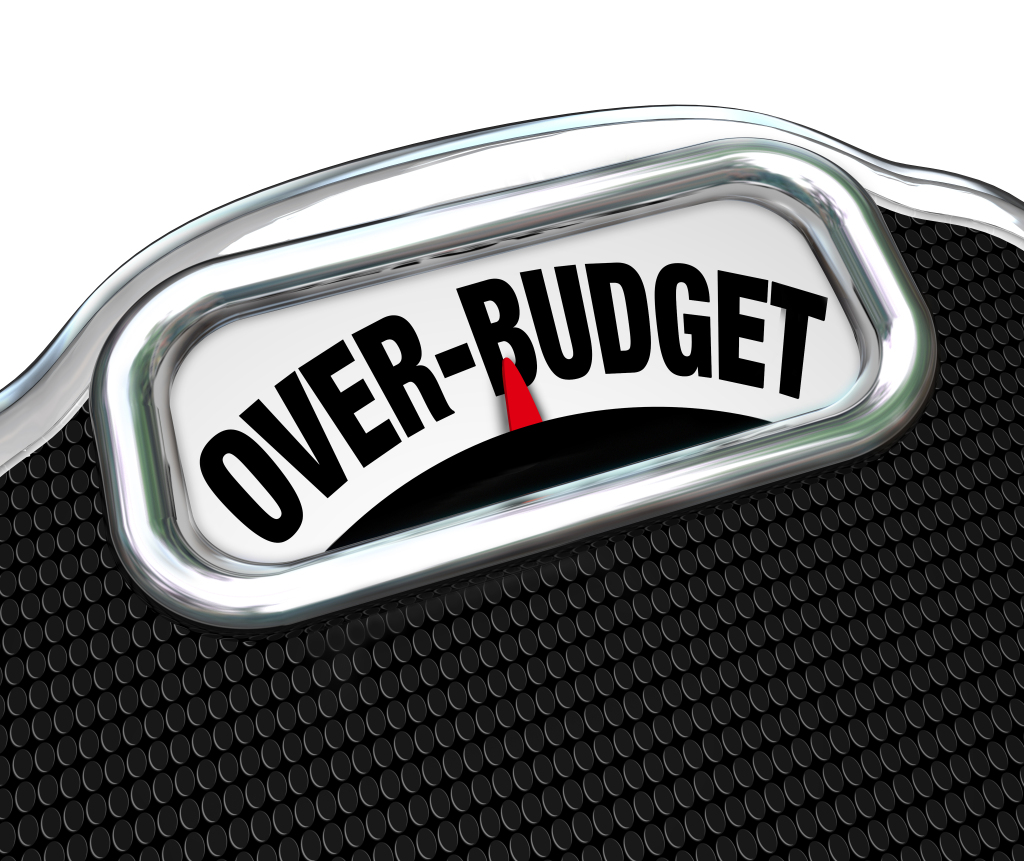The people who do not cringe at the phrase ‘let’s do a budget’ are few and far between, and more often than not they hold accounting degrees.
That particular ‘b’ word (budgeting) has the power to strike fear into the hearts of men and women alike for a number of reasons:
- It’s overwhelming – who has the time to build a spreadsheet with ALL their costs in it? And how on earth can we know what everything will cost in the future?
- It’s boring – nothing is more likely to send you into a catatonic state than sifting through credit card statements and that pile of crumpled-up receipts hiding in the bottom drawer. And try watching the announcements about the Federal budget – positively snore-worthy.
- It can be depressing – realising you spend $760 a year on take-away coffee is not likely to make you feel good.
All these pale in comparison to the One Unassailable Fear associated with budgeting:
If you set a budget,
you just might have to stick to it.
That’s why it’s called a budget – you set it then you don’t budge (I know. I’m hilarious).
This inevitably leads to no more spontaneous shoe purchases because you would then have to:
- Deal with the guilt of breaking your budget, or
- Deny yourself a gorgeous pair of shoes.
It’s lose-lose. Sounds terrible, doesn’t it?
I’m not really doing much to sell the idea of budgeting here am I. Quite frankly, I don’t want to.
Budgeting is not for everyone, and there is no ‘one size fits all’ approach – at least, not that I’ve seen. I will, however, say four things in defense of budgeting:
- A budget does not need to be 100% accurate.
- A budget does not need to be time consuming.
- A budget does not need to be adhered to with religious fervor.
- A budget does not need to be electronic or follow a specific format.
Personally I do a plan every year or so, usually when I’m thinking about buying a property. I tend to review the last plan only when I’m looking at building the next one. It would be a stretch to say I spend more than a few hours a year on this kind of planning. So long as I get it 90% right, I don’t need to look at it. I just set up my bank accounts and automatic transfers to mimic the plan and off I go, oblivious to the comings and goings of every single cent I can lay claim to. Selective ignorance is bliss, and in my case it hasn’t done me any harm.
Still reading? Good. Let’s answer some common budgeting questions…
Do I need a budget?
How do you know if you need a plan for your money? I would strongly recommend developing a plan if you meet any of the following four criteria:
1. You spend more than you earn
This is you if:
- You run out of money between pay days, or
- You have to use a credit card because you don’t have enough cash to buy what you want.
A plan can help someone who spends more than they earn to get motivated to earn more, find areas where they can spend less, and work out what months/weeks will be the biggest strain on their cash flow so they can have a contingency in place.
2. You have escalating debt
This is you if:
- You cannot pay off all your credit card debt tomorrow,
- You have trouble meeting repayments, or
- You are getting charged more in interest than you pay off each month.
A plan can help someone with escalating debt to find short-term ways to spend less so they don’t pay more interest than they need to.
3. Mental maths is not your strong suit
This is you if:
- You can’t work out whether you’ve got the correct change without a calculator, or
- You don’t know within 10% how much your trolley of groceries is going to cost at the check-out.
A plan can help someone who is not good at math to work out how much they can spend on certain items so they don’t need to work it out every time.
4. Big change is coming
For example, you are thinking of:
- Buying a car, home or investment property,
- Retiring, quitting or changing roles / careers, or
- Starting a family.
A plan can help someone who is about to make a big purchase, investment or life change to have the confidence they can afford it.
Zero from four for you?
If you don’t meet any of these criteria, i.e.:
- You earn more than you spend,
- Your debt is manageable,
- You know how much you’re spending without needing a calculator, and
- You’re not planning anything major or life-changing soon.
…a budget is optional. Do it if you feel the need.
How do I make a budget?
A budget can be as simple or complex as you make it. There are two columns to every budget:
- Money coming in (to your hand / pocket / bank account).
- Money going out.
There is only one rule: what goes out needs to be the same or less than what comes in. That’s it. I’m not saying it’s easy, but it is that simple. It can be summarised neatly as:
In > out
(Forgotten 3rd grade math? Hint: the crocodile eats the bigger one.)
Here is the easiest way I’ve found to do a budget – the good ol’ fashioned way with a pen or pencil:
- Take a piece of paper
- Draw a line down the middle to make 2 columns. Title the left column ‘ins’ and the right column ‘outs.
- Start listing the places your money comes from (ins) and goes to (outs), and a rough guess of how much goes/comes*
- Add up the ‘ins’ – convert everything to a yearly basis (e.g. $2,000 per month x 12 months per year = $24,000 per year
- Add up the ‘outs’ – again, convert everything into a yearly basis
- Work out which is bigger:
- ‘Ins’ is bigger than ‘outs’ – congratulations, you don’t need to do anything except decide what you want to do with the money you are accumulating (I put mine into buying assets or leave it in term deposits).
- ‘Outs’ is bigger than ‘ins’ – panic immediately. Well, at the very least, start working out where you can either make more money or cut some of your spending.
- ‘Ins’ and ‘outs’ are equal – you’re walking a tightrope here. If you thought of everything and it’s all accurate, you’ll be fine. One extra bill however and you’ll be in trouble. Look for places to make more money or spend less that you can do quickly if something unexpected pops up.
* Not sure what to include? Here are some examples…
Column 1 is ‘ins’ – the money you earn. Unfortunately for most of us, this column usually has the fewest line items. Typical ‘ins’ include:
- Your salary or wage.
- Any income from investments – properties, shares, dividends from businesses.
- Interest paid on your cash.
Hopefully you know your salary/wage (after tax) – if not, find a payslip or check your bank records. Investment and interest income will depend on what you have – payments every month are common for property and cash deposits, and every 6 – 12 months for shares and dividends.
Column 2 is ‘outs’ – the money you spend. There are literally millions of ways to spend your money, which is of course the problem in the first place. Typical ‘outs’ include:
- Basic living costs – rent, food, electricity, water.
- Transport – petrol, vehicle maintenance, registration, insurance.
- Servicing debt – mortgage, car loan, credit cards.
- Entertainment – eating out, movies, hobbies, travel, gifts.
When should I budget?
Whenever you like. There is no hard and fast rule. As I mentioned, I probably average once per year. I know some people who update their budget every week with all receipts greater than 50 cents. Not my cup of tea, but knock yourself out if you want to. At a minimum, I’d recommend doing a budget when:
- Your income changes dramatically (e.g. you get promoted or fired).
- You are planning a big change in how you spend / invest your money (e.g. buying some shares or a property).
Whether that’s every six months or every ten years, that should be enough.
Budgeting Tips and Traps
If you’re new to this whole budgeting thing, here’s a few tips in addition to the above:
Near enough is generally good enough
Don’t waste hours trying to find out if your car insurance is $402 or $412. Be conservative (go high for ‘outs’, go low for ‘ins’) and in the right ballpark to save time and build in some contingency.
Cash flow is important
If your ‘ins’ and ‘outs’ are equal, but all your ‘outs’ occur in the first half of the year while your ‘ins’ are in the second half of the year, you’re going to need to borrow money to cover the shortfall in the first half of the year, which means you’ll be paying interest. Make sure you include that interest in the budget.
Don’t bother if you are going to ignore it
If your budget clearly shows you’ll be going into debt because you are spending too much, or not earning enough if you prefer that view, you need to change something. Don’t waste your time on a budget unless you are prepared change if you need to. Sure, you may end up broke, in debt and homeless, but at least you’ll have some stress-free spending time before that happens (I’m kidding – ignorance is not bliss in this case!)
Steps to consider:
- Decide if you need or want to budget. If you’re not interested – great! Go take a break, you’ve wasted enough time thinking about this ‘b’ word already.
- If you do want to budget, do it! Make it simple, allow yourself a maximum of one hour to get the first draft down on paper.
- When you’ve worked out your ‘ins’ and ‘outs’, take some action:
- Not enough ‘in’? Find a way to increase your income.
- Too much ‘out’? Work out where you can cut some costs.
- Automate as much as possible:
- Set up accounts for sections of your budget – you can get free accounts online these days so it shouldn’t cost you anything. Ensure you have your ins and outs going to the right account.
- Set aside the cash you need to cover your ‘outs’ immediately when you receive your pay. Better yet, get payroll to send the ‘outs’ money to a separate account so you don’t even see it.
Do you have any tips you’d like to share? Perhaps you’ve got a great budget template, or a story to tell about when a budget did or didn’t work for you. We’d love to hear about it! Please post a comment below
For those in debt and not quite at the stage of bankruptcy, we also have a free course called ‘Get out of debt fast’. You’ll find it on our homepage.
What comes next?
Download our Free Financial Resources
Find the right Money School Course for you
Get the Book: Money School, Become Financially Independent and Reclaim Your Life, Lacey Filipich
Got a question: Contact Us
Lacey Filipich is the co-founder and director of Money School. She helps parents raise financially savvy kids and helps adults get on top of their finances. Connect with her on LinkedIn and follow Money School on Facebook to learn more.






First read about and learnt how to do a money plan aka budget in 1981. Married, new baby, one wage, bought a house and interest rates went whoosh 18%. Read a book from library called Superwoman by Shirley Conran and voila the budget was born (I also learnt “life’s too short to stuff a mushroom”). Took 3 months to cajole DH to allow me to manage the money. Our budget was our lifeline at that time. Of course have stopped and started a few times but i think To ‘B’ it is – for me. 🤗